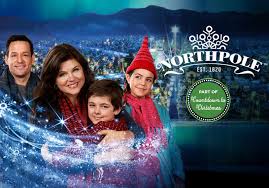I watched a number of Christmas-themed movies this past Christmas season, old and new. And one thing stood out as a repeating pattern, something I had never noticed much before—the idea that belief is power.
In so many of these Christmas movies the people were asked to believe in someone in order to give that someone renewed power… be it Santa Claus, the North Pole, or fairies. Consider the popular movie Elf (2003) starring Will Ferrell as Buddy. At the end of the movie Santa’s sleigh crashes into Central Park. Santa tells Michael, Buddy’s half-brother, that believing in him will make his sleigh fly again. In order to increase the number of believers in Santa to make Santa’s sleigh fly, Michael reads from Santa’s list in front of TV cameras, causing people watching at home to believe. And the sleigh is given its final burst of needed power when all the people gathered sing “Santa Claus is Coming to Town” on live TV, “because the best way to spread Christmas cheer is to sing loud for all to hear.” In the end, the power of belief in Santa and the renewed Christmas spirit of so many people allow the sleigh to fly again.

And there are many other recent movies that have latched onto this same theme—that Santa requires our belief to survive. Think of the half-hour TV animated special Yes, Virginia (2008), which is based on a true story no less from the late 1800s. After being told by her friends that Santa Claus doesn’t exist, 8-year-old Virginia writes a letter to the editor of The New York Sun asking if Santa Claus is real, because she’s been told by her father that if something appears in The Sun then it must be true. An editorial appears in The Sun newspaper stating “Yes, Virginia, there is a Santa Claus,” adding to the popular Christmas folklore—though the answer is more philosophical than literal, stating that Santa Claus exists “as certainly as love and generosity and devotion exist.” At the end of the half-hour show, it shows the Believe Meter’s arrow rising from the renewed faith of Virginia and countless other children who have read the article.
Another one that comes to mind is the Hallmark movie Northpole (2014) starring Bailee Madison as Clementine the elf. In the movie, Santa’s magical home, Northpole, is a city powered by the magic of holiday happiness around the world. And Clementine is concerned by the diminishing of the Northern Lights that are stoked by the happiness of children that create the magic snow that powers Santa’s city. Clementine and her friends set out to ‘save Christmas’ by reviving Christmas cheer—which of course they do.
And it’s not just Santa or the North Pole that need the belief of children to survive. Fairies do too! I watched the live action TV musical version of Peter Pan (2014) this past Christmas. In the musical (as well as in the book) Peter entreats us to believe in fairies to revive Tinkerbell, who has drunk poison. The audience is asked to clap their hands together to show their belief to give Tinkerbell new life. And conversely, Peter tells Wendy that saying you don’t believe in fairies actually kills one.
And it was then, after watching the pattern repeat for the fourth time that it struck me. All these stories have something in common. At the heart of these stories is the belief that belief has power… that belief has the power to give life… and that the lack of belief can kill.
It got me thinking about the nature of belief in Christianity. For it is true that we are saved through faith in Christ. At the heart of our religion is belief in someone. So why did these movies’ portrayal of belief rub me the wrong way? It wasn’t just the object of the belief—Santa or fairies—that raised the red flag for me. What really gave me concern was that in these stories the belief gave that object power. Santa needs our belief to fly his sleigh, the North Pole needs our belief to run, and fairies need our belief to exist.

But in Christianity, that storyline is reversed. God doesn’t need our belief in Him to fly, operate, or exist. God needs nothing from us. Our belief in God gives Him no power whatsoever. In fact, our belief in Him, rather than giving Him power, gives US power. Believers in Christ are empowered by the Holy Spirit to do the will of God. So, belief does give power, to the subject or author believing, rather than the object of belief in the case of Christianity. I always love when I find a paradox (a belief or assumption that seems false, but is nevertheless true) in my faith—they are as lovely and fascinating as they are true. So we can boldly and confidently say, ‘I do believe in God. I do. I do. I do!’

